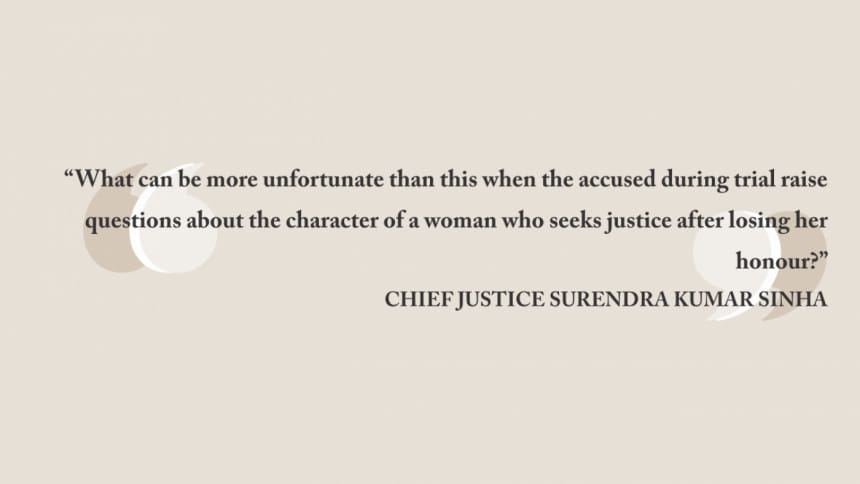Law 144-year-old, favours rapists

For a rape victim, justice in the existing legal system in Bangladesh means further humiliation and unending hassles.
As if losing her honour was not enough, everything seems to work against her -- from recording her statement at police stations mostly manned by male officers to the insensitive two-finger test, violating her privacy to a draconian provision in the Evidence Act of 1872 that allows the rape accused to question her character.
For long, it has been an international standard in criminal justice system that the character, morality and sexual history of a victim are largely irrelevant to a sex crime trial. Countries including the UK, the US and Australia have specific laws to shield victims from such humiliating situation during trial.
But in Bangladesh, section 155 (4) of the Evidence Act still favours a man accused of rape to question the character of his victim to defend himself during trial.
The section says, “... when a man is prosecuted for rape or an attempt to ravish, it may be shown that the prosecutrix [the rape victim] was of generally immoral character.”
Taking advantage of this provision, counsels of the accused ask the victim indecent questions to malign her, which is embarrassing and humiliating for the victim and her family members attending the court proceedings, legal experts say.
"Sometimes, the words defence lawyers use to cross-examine the victims are unspeakable outside the court. The victims feel so humiliated that sometimes they keep their heads down," said a lawyer who practises in a Dhaka court.
'HEINOUS EFFORT'
Laily Maksuda Akhter, director of Legal Aid Unit of Bangladesh Mahila Parishad, said that some defence lawyers try to make a “heinous effort” to portray the victim as a person of immoral character by narrating her relationship history and blame her for the crime.
Rights activists and legal experts have long been demanding abolition of this provision. In May last year, Chief Justice Surendra Kumar Sinha spoke for changes in the controversial provision and urged women leaders to raise their voice against it.
“What can be more unfortunate than this when the accused during trial raise questions about the character of a woman who seeks justice after losing her honour?” the chief justice asked.
Around the same time last year, Bangladesh Law Commission moved to draft a new evidence law, scrapping the existing one. In the initial draft it did not include the draconian provision. But the Commission will take some more time to send it to the government after finalising the draft, said sources in the Commission.
India, which had the same British law enacted 144 years ago, has scrapped the provision in 2003 after a rape victim died of heart attack in a courtroom as counsels of the accused questioned her character.
Instead of protecting victims in a similar fashion, the Bangladesh government seems more interested in increasing punishment.
Under the 1860 Penal Code, rape charge carries up to life term in prison. Under the Prevention of Oppression against Women and Children Act 2000, it is life term plus a fine to be fixed by the court as it sees fit. But if the victim dies or if the rape is committed by more than one man, then death is the maximum punishment.
TWO-FINGER TEST: VIOLATION OF PRIVACY
The two-finger test or virginity test allows doctors to inspect the hymen of women who have been raped. This is also supposed to test vaginal laxity and decide whether the victim is habituated to sexual intercourse.
To prove her complaint before the case is ready for trial, the victim must go through this test, however indecent it may sound.
First, it violates her right to privacy. Second, medical experts worldwide, including in Bangladesh, say this test is unreliable. In their views, if the victim is married, middle-aged or has conceived multiple times, then how could this test help find any evidence?
"Undoubtedly, the two-finger test and its interpretation violate the right of rape survivors to privacy, physical and mental integrity and dignity. Thus, this test, even if the report is affirmative, cannot ipso facto, gives rise to presumption of consent,” said the Indian Supreme Court in a landmark order in May 2013.
In the order, the court asked the government to ban the two-finger test and asked all hospitals to set up designated rooms for forensic and medical examination. Eight months after the SC order, the Indian government banned the two-finger test.
The test also contradicts the International Covenant on Economic, Social, and Cultural Rights 1966 and the UN Declaration of Basic Principles of Justice for Victims of Crime and Abuse of Power 1985. Under the two legal instruments, rape survivors are entitled to legal recourse that does not re-traumatise them or violate their physical or mental integrity and dignity.
In 2013, Bangladesh Legal Aid and Services Trust [BLAST] moved the High Court challenging the test. In response, the HC in October that year questioned the legality and authenticity of the test. It also issued a rule asking the government to explain why the test will not be declared illegal.
The court also asked the health ministry to form a committee of experts to develop a detailed guideline to provide support to rape victims on examination and treatment, and submit the guideline to the court in three months.
The ministry has submitted the draft guideline, proposing abolishing the two-finger test. The guideline itself recognises that the test is “unscientific” and “horrendous.”
The rule remains pending before the HC.
LAWS AROUND THE WORLD
Until 1976, rape accused in England and Wales could question the victim's character by raising questions about her previous sexual history.
In the face of a growing demand for a change, the British government enacted a law, curbing the use of sexual history evidence. This legislation restricted the accused from providing evidence and cross-examining the complainant about any “sexual experience” with a person other than the defendant.
More reforms were brought in 1999 when the government introduced another provision preventing the accused from presenting evidence of the victim's alleged past behaviour before a jury in England and Wales unless it was relevant to the case.
Different states of the US began to protect victims of sex crimes in the late 1970s. These states recognised that the character, morality and sexual history of a victim are largely irrelevant to a sex crime trial.
In the late 1970s and early 1980s, almost every jurisdiction in the US adopted some form of rape shield statute. The laws in each state differ in the scope of the sexual behaviour and time limit of the shield.
Many states do not permit any evidence relating to past sexual behaviour of the victim. The Violence against Women Act of 1994 created a federal rape shield law.
In Australia, all states and mainland territories have rape shield laws that protect rape victims. The principal aim of these laws is to prohibit the acceptance of evidence of a complainant's sexual reputation and to prevent the use of sexual history evidence to establish the complainant as a “type” of person who is more likely to consent to sexual activity.
NO FREE MOVEMENT FOR SEX OFFENDERS
In addition, some countries, including the UK and the US, have introduced sex offender register system -- a mechanism to keep track of sex offenders.
The register contains the details of anyone convicted, cautioned or released from prison for sexual offence against children or adults.
In the UK, those on the register are required to notify the police if they change their names or addresses, and also to reveal any plans to travel outside the country. Failure to comply is an offence. Offenders may also be barred from certain activities and areas frequented by children and tagged electronically.
The UK introduced the system in September 1997.
All states of the US have also enacted sex offenders' registration laws since the 1980s. In 1994, Congress passed a legislation that requires states to enact such laws in order to receive certain federal funding. Introduction of the registration system has significantly curbed sexual violence there.
But things are hardly that forward-looking in Bangladesh.

 For all latest news, follow The Daily Star's Google News channel.
For all latest news, follow The Daily Star's Google News channel. 







Comments